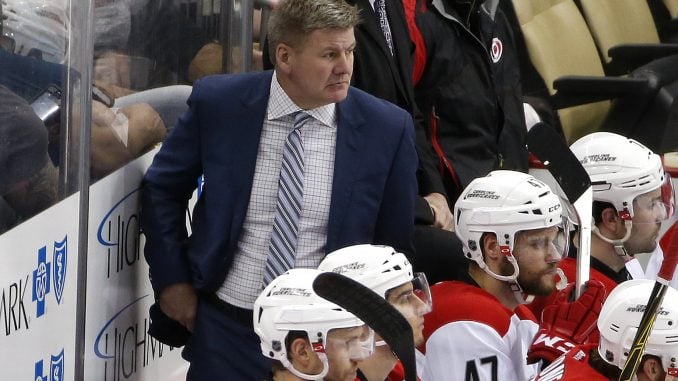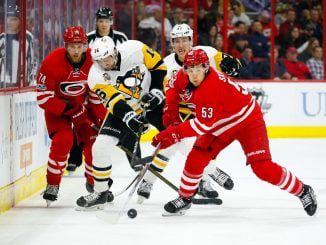
It’s a brave new world in the NHL.
After instances of what can best be described as psychological warfare used on players by Toronto Maple Leafs coach Mike Babcock were revealed following his firing last month, allegations of coaches mistreating players have leaked through a previously impervious dam of silence — more against Babcock and also others, most notably former Hurricanes (and now former Flames coach) Bill Peters.
By all accounts, Babcock’s bullying of players (and even arena staff, according to Hall of Famer Chris Chelios) is disturbing and will give any employer pause about hiring the 56-year-old in the future.
The allegations against Peters go well beyond that.
Racial slurs toward a black player while an AHL coach. Physical abuse of multiple players while with Carolina. And, like Babcock, a widespread resentment by many who worked with or alongside him in hockey.
Some have called the actions of Babcock and Peters — and also Blackhawks assistant Marc Crawford, the latest ensnarled in this reckoning after former NHLer Sean Avery accused him of abuse when he was the Kings’ head coach — old school.
In a way, it is.
A book and a made-for-TV movie were made about Paul “Bear” Bryant’s “Junction Boys” — celebrating how the legendary coach “toughened” up his new team after he was hired by Texas A&M. Two water-soaked towels — one for the entire offense, one for the whole defense — were the only relief in the 100-degree temperatures on 16-hour days in the Texas heat.
In the following decades, how many kids died on high school and college football fields because a coach thought depriving players of water built character, grit and resolve?
Herb Brooks, the coach and architect of the 1980 “Miracle on Ice” U.S. Olympic gold medal team, is legendary for trying to get his upstart team to collectively hate him as a means to bring them together. Books were written and, yes, a movie made about how Brooks toed this line all the way to eternal glory.
How many coaches, thinking that was the only or best way to motivate players, didn’t see past the surface of Brooks’ plan and thought demeaning players — even assaulting them — was the path to success?
Which brings us back to Peters.
His slurs toward Akim Aliu when he was coach of the Rockford IceHogs were reason enough for the Flames to dismiss Peters. But let’s be honest: Hockey has long been a predominantly white sport, and the realization that there are racists at even its highest levels should surprise no one.
That doesn’t excuse Peters’ words or alleged lack of apology after the fact (both then and now, a decade later), but we’d be fools to think there aren’t people with malice in their hearts in hockey — and, really, everywhere.
The subsequent accusations that he kicked former Hurricanes defenseman Michal Jordan and punched an unnamed Carolina player during his tenure just solidified what we already knew: Peters is a bad guy, plain and simple.
And we can do the “he said, he said” between Ron Francis and Peter Karmanos, the former Carolina general manager and owner, respectively, about who knew what regarding Peters and what actions were — or, rather, weren’t — taken during the 2014-15 season.
Why wasn’t Peters fired? Why was he given a contract extension despite failing to snap the Hurricanes’ postseason drought and the team showing little progress, all with the hidden shadow of this red flag?
Furthermore, why wasn’t more due diligence done before he was hired? Both Francis and Karmanos have endless contacts in the hockey world — surely one of those contacts knew about Peters’ actions in the AHL or some other misdeed of which we’re currently unaware?
Perhaps the NHL’s investigation will shed more light on that, though it seems unlikely the league would be interested in dragging the names of two Hall of Famers — including one as revered as Francis — through the mud in the name of “the truth.”
One thing, though, is abundantly clear. We’re getting closer to a day when professional athletes won’t be afraid to speak out when their coach uses a slur or does their best Bobby Knight impersonation. And hopefully, there’s a trickle-down effect to colleges and high schools, where players have even less of a voice, that they’ll speak out against those who abuse their power under the guise of motivation or toughness.
Everyone is thirsty for change, and there’s plenty of water to go around. I think we can all drink to that.




